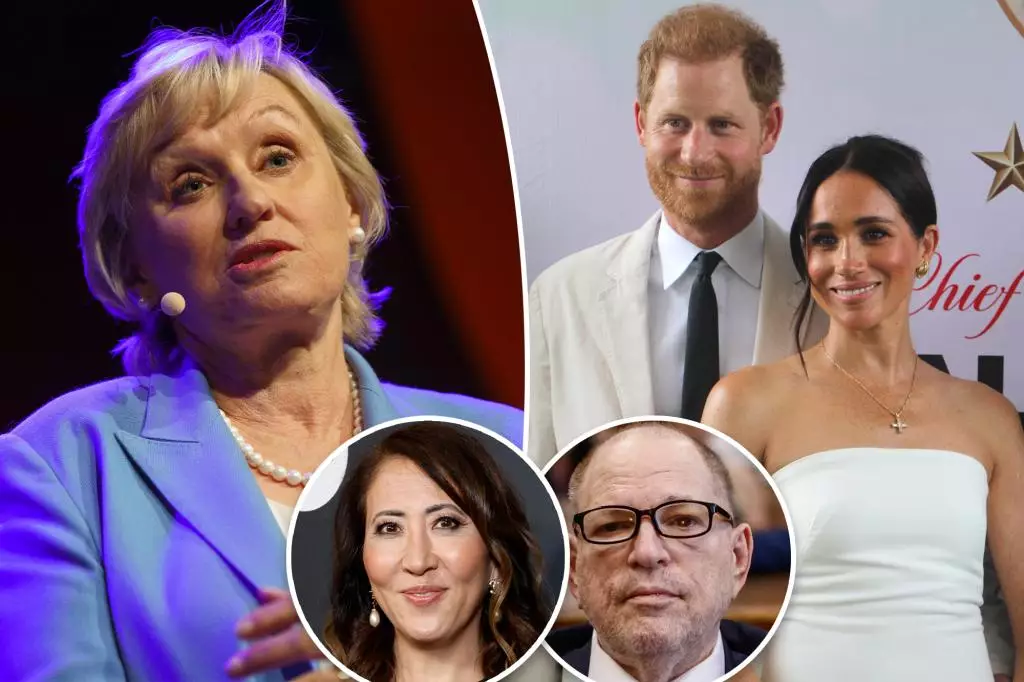Tina Brown, a prominent journalist and editor, has stirred public interest with her candid remarks about Prince Harry and Meghan Markle while promoting her new Substack, “Fresh Hell.” Her insights, albeit provocative, offer more than just gossip; they furnish an opportunity for reflection on the complexities of celebrity, identity, and the repercussions of public life. This article examines Brown’s assertions regarding the Sussexes and provides a broader analysis of their circumstances within the context of modern celebrity culture.
Brown’s critique begins by addressing Harry’s departure from royal duties, labeling him as a “naïve lamb to the slaughter.” Such characterizations spark debate about the psychological and emotional trajectories of individuals who step away from firmly established roles. For Harry, who has lived his entire life in the public glare, the transition to independence—especially in alignment with a partner who has faced her own waves of media scrutiny—poses profound challenges. While Brown finds the criticism that Harry faces in England inevitable, it raises questions about the broader societal implications of public defection. There is a tendency to vilify those who break the mold, and Harry’s case is emblematic of a society that clings rigidly to tradition.
The irony, as noted by Brown, lies in Harry’s apparent aptitude for his royal duties—“he’s really sort of flawless at it.” This observation begs the question: what does it mean to be “good” at something that inherently places one at the intersection of public expectation and personal authenticity? Harry’s competencies as a prince may not translate into success as an independent figure, a reality that might diminish his identity further. His royal persona and skills may ultimately become a double-edged sword, leading to an unnavigable path through his new life in California.
Brown takes a harsher stand on Markle, suggesting that she possesses “the worst judgment of anyone in the entire world.” Such an assertion reflects a broader trend where women, particularly those who step outside societal expectations, are scrutinized more harshly than their male counterparts. Markle’s journey from a Hollywood actress to a duchess and her subsequent decisions mark her not only as an ambitious individual but also as a target of public derision. The claim that her ideas are “total crap” may resonate with viewers who have internalized narratives about the Duchess being out of touch, yet it conveniently ignores the multiple layers behind her ambitions.
Yes, Markle’s ventures toward entrepreneurship and social advocacy have been met with skepticism, but this skepticism is compounded by historical biases that women face when asserting their autonomy. In a world where women are still underrepresented in positions of power, Markle’s criticism serves to reinforce a narrative that women should occupy a limited space of acceptability. Brown’s remarks encapsulate a complex interplay of jealousy, fear, and public perception where high-profile women who tread outside traditional boundaries face relentless judgment.
An underlying theme in Brown’s commentary is the severe impact of celebrity culture on personal identities. For both Harry and Meghan, the transition to life away from the royal family does not only entail a change in lifestyle but also a critical reevaluation of self. Their brand evolution is fraught with difficulty, as they must contend with shifting public opinions and the relentless demands of fame. The marriage of high-profile individuals within a context like the British monarchy creates a potent narrative tension; every misstep is amplified and debated by millions.
Moreover, Brown’s reflections on her own past choices—specifically her collaboration with Harvey Weinstein—add another layer to this cultural critique. Her admission regarding the decision to work with him serves as a poignant reminder that the allure of fame can often cloud judgment. Just as Meghan appears to be judged on her career missteps, Brown’s past choices highlight the unpredictability of personal and professional alignments in a landscape dominated by power dynamics and exploitation.
Tina Brown’s remarks about Prince Harry and Meghan Markle compel us to engage in a more extensive dialogue regarding the nature of celebrity and the pressures of public life. While Brown’s characterizations may resonate with existing narratives, they also underscore the risks associated with stepping into the limelight—particularly for women. Both Harry and Meghan are navigating a turbulent landscape, fraught with biases and public judgments. As we assess the entirety of their journey, one must question whether society will continue to hold them to unattainable ideals or afford them the grace to redefine who they are beyond their former roles. The story of the Sussexes invites us to reflect on our own perceptions of loyalty, authenticity, and personal growth in a world that demands conformity over individuality.

